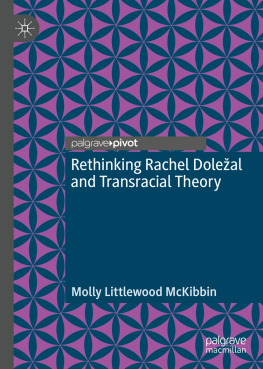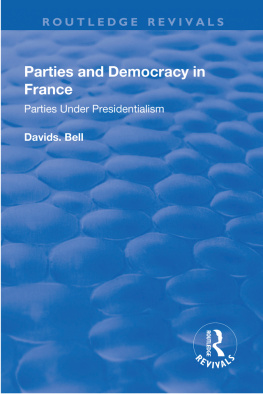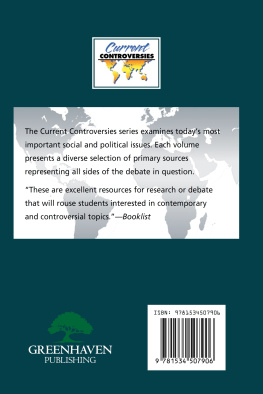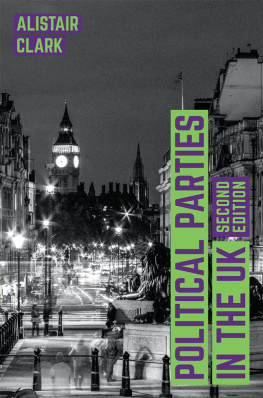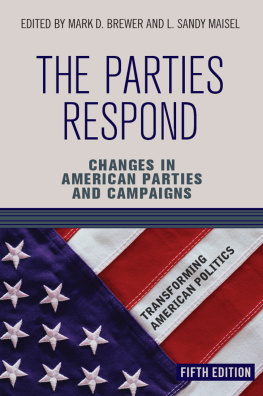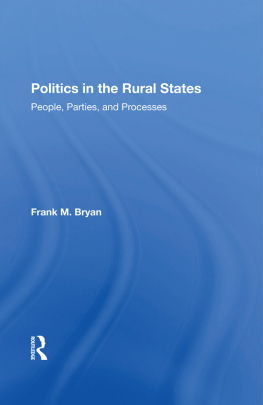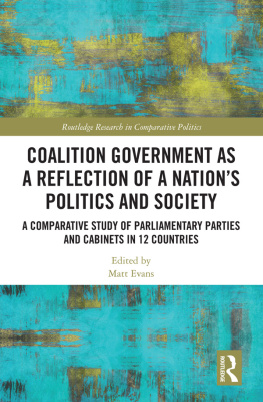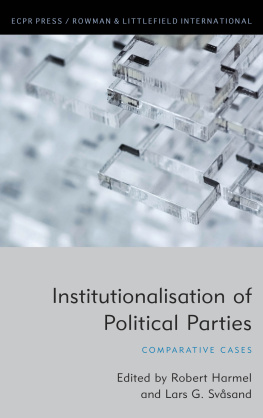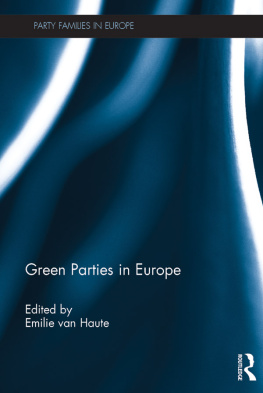McKibbin - Parties and People
Here you can read online McKibbin - Parties and People full text of the book (entire story) in english for free. Download pdf and epub, get meaning, cover and reviews about this ebook. year: 2010, publisher: Oxford University Press USA - OSO, genre: Politics. Description of the work, (preface) as well as reviews are available. Best literature library LitArk.com created for fans of good reading and offers a wide selection of genres:
Romance novel
Science fiction
Adventure
Detective
Science
History
Home and family
Prose
Art
Politics
Computer
Non-fiction
Religion
Business
Children
Humor
Choose a favorite category and find really read worthwhile books. Enjoy immersion in the world of imagination, feel the emotions of the characters or learn something new for yourself, make an fascinating discovery.

Parties and People: summary, description and annotation
We offer to read an annotation, description, summary or preface (depends on what the author of the book "Parties and People" wrote himself). If you haven't found the necessary information about the book — write in the comments, we will try to find it.
Parties and People — read online for free the complete book (whole text) full work
Below is the text of the book, divided by pages. System saving the place of the last page read, allows you to conveniently read the book "Parties and People" online for free, without having to search again every time where you left off. Put a bookmark, and you can go to the page where you finished reading at any time.
Font size:
Interval:
Bookmark:
PARTIES AND PEOPLE
England 19141951
ROSS MCKIBBIN
The Ford Lectures delivered in the
University of Oxford in Hilary Term 2008


Great Clarendon Street, Oxford OX2 6DP
Oxford University Press is a department of the University of Oxford.
It furthers the Universitys objective of excellence in research, scholarship,
and education by publishing worldwide in
Oxford New York
Auckland Cape Town Dar es Salaam Hong Kong Karachi
Kuala Lumpur Madrid Melbourne Mexico City Nairobi
New Delhi Shanghai Taipei Toronto
With offices in
Argentina Austria Brazil Chile Czech Republic France Greece
Guatemala Hungary Italy Japan Poland Portugal Singapore
South Korea Switzerland Thailand Turkey Ukraine Vietnam
Oxford is a registered trade mark of Oxford University Press
in the UK and in certain other countries
Published in the United States
by Oxford University Press Inc., New York
Ross McKibbin 2010
The moral rights of the author have been asserted
Database right Oxford University Press (maker)
First published 2010
All rights reserved. No part of this publication may be reproduced,
stored in a retrieval system, or transmitted, in any form or by any means,
without the prior permission in writing of Oxford University Press,
or as expressly permitted by law, or under terms agreed with the appropriate
reprographics rights organization. Enquiries concerning reproduction
outside the scope of the above should be sent to the Rights Department,
Oxford University Press, at the address above
You must not circulate this book in any other binding or cover
and you must impose the same condition on any acquirer
British Library Cataloguing in Publication Data
Data available
Library of Congress Control Number: 2009942565
Typeset by Laserwords Private Limited, Chennai, India
Printed in Great Britain
on acid-free paper by
MPG Biddles Ltd., Kings Lynn, Norfolk
ISBN 9780199584697
1 3 5 7 9 10 8 6 4 2
This book has a somewhat complicated history. It is the published version of the Ford Lectures in British History which I gave in the University of Oxford in 2008. The lectures themselves arose from my book Classes and Cultures: England 19181951 (1998) which was originally commissioned by the Oxford University Press as a volume in the New Oxford History of England. In this instance the author exercised insufficient discipline and the volume got out of hand. As a result I suggested to the Oxford Press that the single volume become twoone primarily social and the other primarily political. The Press understandably rejected this suggestion but generously agreed to publish the predominantly social volume as Classes and Cultures. It was, however, not entirely social. A significant part of the book, particularly the chapters on the social classes, was in the broadest sense political. That was deliberate; without it the book lacked a conceptual spine. But there was undoubtedly an awkward element in this. When I was asked to give the Ford Lectures I decided to deliver them as the unwritten second volume. As a result, there is inevitably some overlap between Parties and People and Classes and Cultures, especially in the second chapter. Where this occurs I have noted it in the footnotes. But even where there is overlap the argument is not necessarily the same. The explanation, for instance, I gave in Classes and Cultures for the radicalization of opinion during the Second World War, a fairly conventional one, missed the only explanation that can be drawn from the evidence. The treatment of the Second World War here differs both in argument and length from its treatment of Classes and Cultures. This book also begins earlier. I thought it necessary to have a chapter on the nature of the Edwardian political system and the effect of the First World War on it. Otherwise what happens after 1918 makes little sense.
Parties and People is a study of England. It comes from what was to be a history of England, but that is not the only reason why it is confined to England. It concentrates on England not from any insensitivity to the plurality of the United Kingdom, nor simply because Englands size made its political system the most important in that idiosyncratic Kingdom, but because in this period English politics were to a quite unusual degree in step with the politics of Scotland, and Wales, if not so in step with Northern Ireland. It is also a study of the political culture of a democratic society. After 1918, nearly everyone thought of England as a democracy and almost all were agreed that a parliamentary system based upon a wide (and after 1928 universal) franchise, together with free and apparently class-neutral political and judicial institutions, was both democratic and desirable. Even in the darkest days of war and depression few thought that this system could or should be undermined. There was, however, less agreement as to whether democracy meant more than this. How far, for example, was it to be social? How far was the state to be an instrument of democratization? How far were the political parties themselves to be democratic, to be open rather than closed institutions? How far should they encourage democratic behaviour among the electorate? And how far was there to be a democratic relationship between the electorate and political and social elites? To what extent, in other words, did the electorate make up its own mind on politics or allow others to do it for them? What kind of democracy did emerge and what other forms might have done so? As well as being a study of Englands political culture this is, therefore, a history of the sociology of the English electorate in this period and the forces that shaped its political opinion and behaviour. These are questions not unique to this book. David Marquand has recently tried to answer them in Britain Since 1918 (2008), but the treatment of them here is significantly, indeed almost completely different, both as to method and answer.
The second theme of the book is what we might call structure and contingency. There was in this period a party-political transformation which happened in three stages. The first was the disappearance of the Liberal Party as Englands major progressive party after the First World War and the simultaneous emergence of Labour in that role. The second occurred in 1931 when the failure and then collapse of the 1929 Labour government made possible a huge regrouping of the anti-socialist electorate in a National government Conservative in almost all but name. The third was the unexpected overthrow in 1940 of the Conservative predominance established in 1931something formally recognized by the voters in 1945 when Labour won its first outright victory. How we explain this transformation largely depends on what kind of balance we draw between structure, what seems likely given underlying social and economic evolution, and contingency, those unpredicted and unpredictable historical accidents that can still have profound consequences: one of which was to determine not only the fate of the parties themselves but the type of democracy England was to be. If, for example, the Liberal Party had survived or the politicalmilitary crisis of 1940 had not undone Conservative predominance, England could easily have developed different constitutional forms and a different kind of democracy.
There were six lectures in the series and each lecture has become a chapter in this book. Although each chapter is longer than its original, the structure of the lectures has been preserved. The first chapter I have described. The second chapter has two main foci: the reasons for the failure of Lloyd Georges coalition to transform itself into an anti-socialist party embracing all anti-Labour forces, which seemed within the logic of English politics at the end of the war; and the inability of the political system to adjust to post-war social change. The third chapter considers the apparent failure of the second Labour government (192931), why that happened and why the 1931 crisis re-founded a stable political system based upon a moderate constitutional Conservatism whose electoral hegemony seemed permanent. That hegemony did come to an end, however, and the fourth chapter considers what part the Second World War played in this. The fifth chapter is concerned primarily with the policies of the Attlee government, their ideological origins, their results and the way the electorate (and the Conservative Party) did or did not react to them. The sixth chapter sums up the argument of the whole book: the development of class as the principal (but by no means perfect) determinant of political behaviour, the relation of events to structures, and the emergence of a hybrid democracy, neither individualist nor social, whose institutions and values were allowed to survive more for the stability they promised than for the democracy they promoted.
Next pageFont size:
Interval:
Bookmark:
Similar books «Parties and People»
Look at similar books to Parties and People. We have selected literature similar in name and meaning in the hope of providing readers with more options to find new, interesting, not yet read works.
Discussion, reviews of the book Parties and People and just readers' own opinions. Leave your comments, write what you think about the work, its meaning or the main characters. Specify what exactly you liked and what you didn't like, and why you think so.

